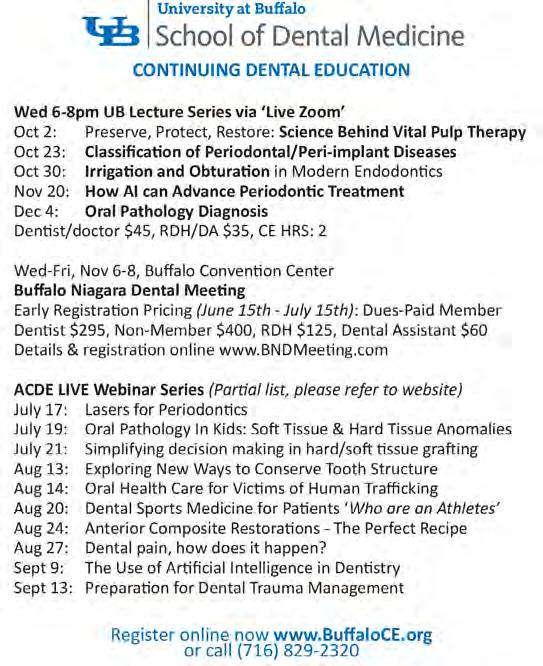
8 minute read
Editorial
Dentist and Dental Hygienist Compact License Portability without Federal Control
State governments and licensing agencies, dental education and organized dentistry must partner to attain dental and dental hygiene license portability through an interstate agreement.
The dental and dental hygienist license portability train has left the station. Its engineers currently include nine states that passed the model interstate Dentist Dental Hygienist Compact (DDH Compact) legislation. However, disputes among oral healthcare stakeholders regarding differing licensing standards, individual state authority, regulatory and resource challenges, and public safety concerns threaten to derail the transport before it boards additional states as members. State dental associations, with the support of the ADA, must advocate and lobby to reconcile these surmountable statutory and administrative policy differences among state boards, licensing agencies and legislatures, and dental education to keep the legislative passage of the DDH Compact on track in all remaining states and prevent calls for federal licensing.
The DDH Compact
The 2018 Report of the ADA Task Force on Assessment of Readiness for Practice recommended states amend dental and dental hygiene licensure requirements to increase license portability.[1] The report proposed state legislatures establish a common core of licensing credentials that act as a template for dentist
and dental hygienist licensure compacts among states. Currently, approximately 43 states have entered at least one license compact for physicians, nurses, emergency medical technicians, physical therapists, or audiologist and speech language pathologists.[2]
The Task Force concluded that the current state dental licensing processes involving multiple combinations of different clinical assessment examinations and credentialing requirements offered through multiple regional testing agencies in various states limits professional mobility. License portability would meet increasing demands for streamlined multistate practice, an expanded workforce and improved access to care. Furthermore, the report observed, the often inconsistent and arbitrary state licensing restrictions did not result in measurably better dental health or improved patient safety as intended.[3]
In January 2023, the National Center for Interstate Compacts at the Council of State Governments, in consultation with the American Dental Association and the American Dental Hygiene Association, and funded through the Department of Defense, drafted and released the model DDH Compact. It required states to enact its model language into law, without substantive change, to officially join the Compact. To date, nine states have signed the Compact into legislation, including Iowa, Washington, Wisconsin, Tennessee, Virginia, Kansas and Maine, the first seven required to officially activate the process.
The DDH Compact enables a dentist or hygienist licensed in their home state to apply for a Compact Privilege to practice in any other participating state without the need to navigate the expensive and time-consuming process of obtaining a license in that state.[4] The Compact creates common licensing requirements, rules and policies that apply to all member states and establishes a Compact Commission composed of one delegate from each state to assist in administrating day-to-day duties, sharing license database information and overseeing compliance with Compact provisions.[5] The provisions represent a consensus on common credentialing requirements that more than adequately incorporates the various differing standards and, at the same time, respects individual states’ autonomy to regulate oral healthcare practice and protect the public in their own state.
Reconciling State Concerns
The DDH Compact provisions regarding participating state and licensee eligibility adequately addresses states’ primary concern that setting core licensing standards among states with previously differing credentialing requirements could influence or lower standards in states with self-proclaimed higher standards.
Section 3 of the DDH Compact[6] establishes that states must adopt the following minimum standard licensing requirements, among others, to be eligible to join as a member:
• National Board Exam of Joint Commission on National Dental Exams (JCNDE).
• Degree from Commission on Dental Accreditation (CODA) accredited predoctoral educational program.
• Clinical assessment.
• Continuing professional development requirement.
• Mechanism to receive and investigate complaints regarding licensees.
• Implement applicant FBI background checks.
• Participate in the Compact data system.
• Notify the Compact Commission of any adverse action or investigative information regarding a licensee or applicant.
Section 47 establishes the following requirements for a licensed dentist or dental hygienist to obtain a Compact privilege in a participating state:
• Active, unencumbered license in a participating state.
• National Board Exam of JCNDE.
• Degree from CODA-accredited predoctoral education program.
• Successfully complete a clinical assessment.
• No disqualifying criminal history, including a felony conviction, within five years.
• Meet jurisprudence testing requirement of state in which seeking privilege.
• Report any adverse actions taken by any non-participating state.

The Compact defines clinical assessment to include all paths to licensure currently accepted, including the ADEX exam, certificate from a CODA-accredited PGY-1 program, the Dental Licensing Objective Structured Clinical Exam (DLOSCE), and a Portfolio compilation of clinical assessments. Certain state licensing boards’ absolute requirement of a de novo psychomotor hand-skill test seems unnecessary and over-reaching in that dental schools average about 100 hours of hand-skill assessments on manikins prior and in addition to live patient care.[8] CODA must ensure schools meet hand-skill assessment standards. State boards should work together with dental schools to calibrate assessments.[9]
In turn, the licensing process must recognize that CODA-accredited schools graduate students only when they demonstrate adequate psychomotor abilities. Regardless, most disciplinary board actions stem from deficiencies in clinical judgment, ethics violations, fraud or substance abuse, not hand-skill deficiencies.[10] Overall, the Compact standards meet most critical state standards and vary only with respect to debatable opinions on the timing and type of assessment of clinical and hand-skill competency.
On the issue of individual states retaining authority and control over licensing and the quality of professional practice, the Compact specifically protects each state’s right to control who they license and the scope of practice for their state. Section 9 Rulemaking, Subsection B, states that where the Rules of the Commission conflict with the laws of a participating state regarding scope of practice, the Commission’s rule will be ineffective in that participating state.[11] Since each state appoints one delegate to the Commission, each with one vote on rules and bylaws, only participating states collectively retain control, without influence from the federal government or any other national, state, public or private organization.
The Compact enables states to protect the health and safety of its citizens with a detailed disciplinary process, including the authority to take appropriate adverse actions against a licensee’s home state license or remote state Compact Privilege. Section 6 provides that, among participating states, the state of licensure has the exclusive authority to take action against a licensee’s license but can base its action on the results of a remote state’s investigation.[12]
Remote states, individually or jointly with other participating states, can investigate any alleged violations of an applicant for a Compact Privilege or dentist or hygienist practicing under a Compact Privilege utilizing subpoenas for witnesses and evidence from other member states. Section 4D provides that remote states can, in accordance with the remote state’s law and due process, revoke or suspend any licensee’s Compact Privilege or impose a fine or take any other action necessary to enforce its laws and protect the public. In Section 8, the Compact creates a shared licensing information database that mandates participant states to submit standard information on all licensees.[13]
The cooperation of multiple states in the investigative processes will increase effectiveness and pool resources to reduce costs.
Organized Dentistry’s Role
The license portability train will reach its final destination of a common, reliable process for dental and dental hygienist licensure either as a voluntarily entered DDH Compact among most or all states or, in the alternative, a new costly and inefficient federal agency imposing national licensure upon our profession. State dental associations stand in the best position to open communication, facilitate understanding and build trust among stakeholders as we lobby for legislative passage of the DDH Compact.
The ADA and ADHA have contributed their expertise to the years-long compact drafting process. State dental associations must bring state boards, dental schools and CODA together to measure and determine clinical competency earlier in the educational and credentialing process and depend less on postgraduation, one-time high stakes exams. The dental profession must decide whether we engineer and lead the license portability train to a 50-state DDH Compact Agreement or arrive as a passenger on the national licensing express.

REFERENCES
1. Joint Task Force of the American Dental Association, American Dental Education Association, and American Student Dental Association. Report of the Task Force on Assessment of Readiness for Practice. Issued September 2018. https://www.adea.org/TARPreport
2. NYS Education Department. https://www.op.nysed.gov/sites/op/files/2023-02/Compacts%20 Presentation_final.pdf
3. Joint Task Force of the American Dental Association, American Dental Education Association, and American Student Dental Association. Report of the Task Force on Assessment of Readiness for Practice. Issued September 2018. https://www.adea.org/TARPreport
4. DDH Compact, Sec. 2G and 4A, https://ddhcompact.org
5. DDH Compact, Sec.7, https://ddhcompact.org
6. DDH Compact, Sec. 3, https://ddhcompact.org
7. DDH Compact, Sec. 4, https://ddhcompact.org
8. American Dental Association. Myths vs. Truth About Dental Education, Testing, and the DDH Compact. 2024. https://ddhcompact.org/wp-content/uploads/sites/31/2024/03/Mythsand-Truths-in-Testing-and-Examination.pd
9. Joint Task Force of the American Dental Association, American Dental Education Association, and American Student Dental Association. Report of the Task Force on Assessment of Readiness for Practice. Issued September 2018. https://www.adea.org/TARPreport/
10. American Dental Association. Myths vs. Truth About Dental Education, Testing, and the DDH Compact. 2024. https://ddhcompact.org/wp-content/uploads/sites/31/2024/03/Mythsand-Truths-in-Testing-and-Examination.pd
11. DDH Compact, Section 9B. https://ddhcompact.org
12. DDH Compact, Sec.6A and 6B. https://ddhcompact.org
13. DDH Compact, Sec.8. https://ddhcompact.org/











